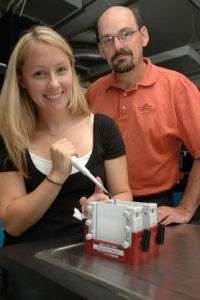Study points to potential new use for Viagra

A "basic science" breakthrough by Queen's University researchers into regulating a single enzyme may lead to new drug therapies that will help prevent heart attacks and strokes.
Led by professor of Pharmacology and Toxicology Donald Maurice, the study focuses on the effects of Viagra – the popular erectile dysfunction drug, which is also used to treat pulmonary hypertension.
The team's findings will be published on-line this week in the international journal Proceedings of the National Academy of Sciences (PNAS).
"As scientists, we're excited about this discovery because it's a fundamentally new approach to regulating what enzymes do in cells," says Dr. Maurice, a Career Scientist with the Ontario Heart and Stroke Foundation. "The fact that it also offers a potentially novel use of a drug already widely in use for other applications is an unexpected bonus."
The enzyme targeted by the Queen's researchers is known to regulate the activity of platelets: small blood cells needed for normal blood clotting. Problems can arise when people have stents permanently implanted in their arteries to maintain blood flow. Their platelets sometimes bind to the stent and, if enough platelets accumulate to form a blockage, this may cause a sudden, massive heart attack or stroke to occur.
Drugs like Viagra have been shown to inhibit PDE5, explains Lindsay Wilson, a PhD student in Pathology and Molecular Medicine and first author on the study. Until now, however, it hasn't been possible to isolate the small "pool" of activity within the cell where this is occurring.
The Queen's study shows that within each cell there are two different pools of the PDE5 enzyme, but that only one of them regulates platelet activation. "Understanding how the cell works should allow us to affect the activity of enzymes in one neighborhood – and leave alone their 'identical twins' in a different neighborhood in that cell," says Ms Wilson.
"The idea is to use a PDE5 inhibitor such as Viagra selectively to inhibit platelet function," she continues. We now know that not all the enzymes in the cell are doing the same job. Just like in real estate, it's all about the location!"
Source: Queen's University





















